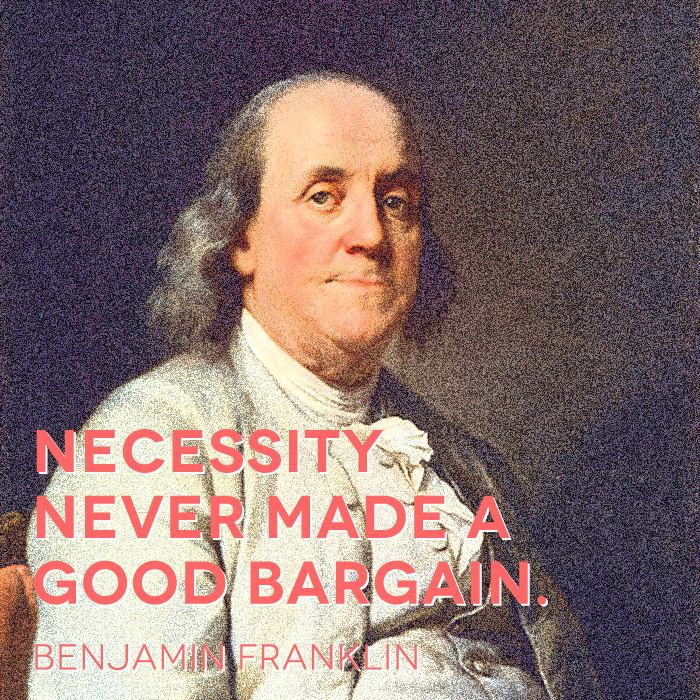

…not as much as you might think.
Last year, I went into our local AT&T store to cancel my wireless account and was greeted with pleasantries until they discovered why I had dropped in. Once my intentions were known I was questioned rather tactlessly about my decision. I assured them that I had considered all of the implications of leaving + promised them that I really would be OK. (It’s been a year, and I am!)
As consumers, we are often told we ‘need’ a device, or ‘have to’ get this feature, or ‘can’t make it without’ product x. We’re happy to oblige because the reasoning used by the marketers follows logic – and you can’t argue with logic. Or can you?
Logic, so far as I have experienced, is overrated and extremely subjective.
As small business owners, we are bombarded by offers for new products and services that will make our lives easier, create more time in our day, remove hassles + stress, and create overnight success – for a price. It can be a bit overwhelming at times. I’ve also noticed that it can leave us questioning our current methods, wondering if we’re doing something well enough, or feeling frustrated by impersonal marketing. So how do we begin to sift through these impressive deals + gimmicks and decide if they’re really for us or not?
The key is understanding the real value of an item or service.
Why? Understanding the real value of anything (as it pertains to ourselves + our clients / customers) allows us to make informed decisions. Informed decisions lead to the same benefits many products and services claim to begin with. Peace of mind tends to sneak in too – that’s a nice bonus, if you ask me.
Say Goodbye to Fear-Based Buying (+ Selling!)
As I left the store I felt liberated, not just from the overpriced bill, but from the fear mindset. I was no longer letting someone else tell me what I had to have in order to ‘survive.’ I thought about it further and was astounded by the number of places we have become accustomed to feeling this way.
We’re constantly being told if we don’t buy an [insert the next big thing] right now, we’ll be left in the dust. The world will move on without us. People will consider our methods stone-aged. We will be replaced by a shinier version of ourselves.
Guess what?
That’s not true.
It’s more important than ever that we take stock before making a purchase. Impulse buying is one thing when you’re at the checkout and decide to indulge in some candy. It’s another thing completely when purchasing means committing a large sum of money for something we may or may not use. Ever hear of buyer’s remorse?
So what are small business folk to do?
I’ve made a list of the things that help us make informed + intentional purchases for our business. These are tips for BIG sticker items. Obviously, if you need some sticky notes, you don’t need to consult your accounting department.
Don’t Buy It the First Time You See It
Look into your options, research the details of the item or service, make sure it’s the right ‘size’ for your business, read reviews, contact the company with any questions you might have, Google it. Get to know the products really well. If you feel like something is missing, do the same for a comparable item or items.
Split second decisions don’t often end well. Take your time; that way when you head to the store or click the ‘Buy Now’ button, you’re doing so without hesitation because you know it’s right for you – not because it’s ‘now or never.’
Make a Wish List
When you recognize a need in your business (a streamlined e-commerce solution, automated social media updates, a ghost-writer for your blog…), write it down. Keep your real needs in front of you.
Keeping track of the difficulties + frustrations we experience on a daily basis is a great learning tool. It helps us understand our strengths + weaknesses, puts time management into perspective, and separates wants + needs into tidy piles. Knowing the areas we need to improve upon or find different solutions for allows us to approach purchases with a clear goal in mind.
That way, the next time you receive an enticing offer, you can measure it against your wish list and either a.) proceed knowing that it will fulfill your needs; or b.) stick it in the recycle bin without wondering ‘what if’?
Be Honest
We’ve all been there: a sparkly new thingamabob is staring at us and we think ‘All the big guys use these…I’ve got to get one in order to grow my business.’ Remember: small business is small for a reason. We are not the big guys. We don’t do the same things the big guys do. We don’t need the same things the big guys need.
Now that’s not to say that we can’t benefit from the same things, but being a small business means we have a bit more flexibility when it comes to our needs. Step back from the snazzy display and decide if your interest in the product is due to its popularity or your actual need. It’s fine to want things, but I’m betting you’d a lot happier waiting until you really need (and will use) that big ticket item to purchase it.
Look for an Alternative
Quite often, we’re in need of a solution and we think we have to spend a lot of money to get one. Not so, my friends! I’m guessing that 75% of the things we need (in business) can be found at a very reasonable price – if not FREE – just by doing a little dirty work. You know, if you consider Googling ‘dirty.’
Need a new craft table? CraigsList. FreeCycle. The curb. Want to automate your newsletters? MailChimp. Need to grow your business library? BookMooch. The library. Want to learn how to crochet a tea cozy? YouTube. Need a bio page tonight? About.me. There are countless free and low-cost resources out there just waiting to be found.
In terms of software + programming, I’d up my guesstimate to 85% of the things we need could be found (legitimately!) through open-source channels. We’re extremely fond of OpenOffice, WordPress, Thunderbird, and FileZilla to name a few.
…and last but not least:
If You Need It, Buy It
Only you know what is best and necessary for your business growth. If something exists that you know would free up your time, save you money, or automate a tedious part of your process, buy it. Waiting for an item to go on sale just to save a few bucks will drive you bonkers. I’ve been there, and I can tell you that the relief a useful business tool provides is well worth the money.
Bottom line: If you’ll use it and can afford it – even if it’s a bit of a stretch – it’s worth it.

I’ll leave you with Mr. Franklin’s wise words…


